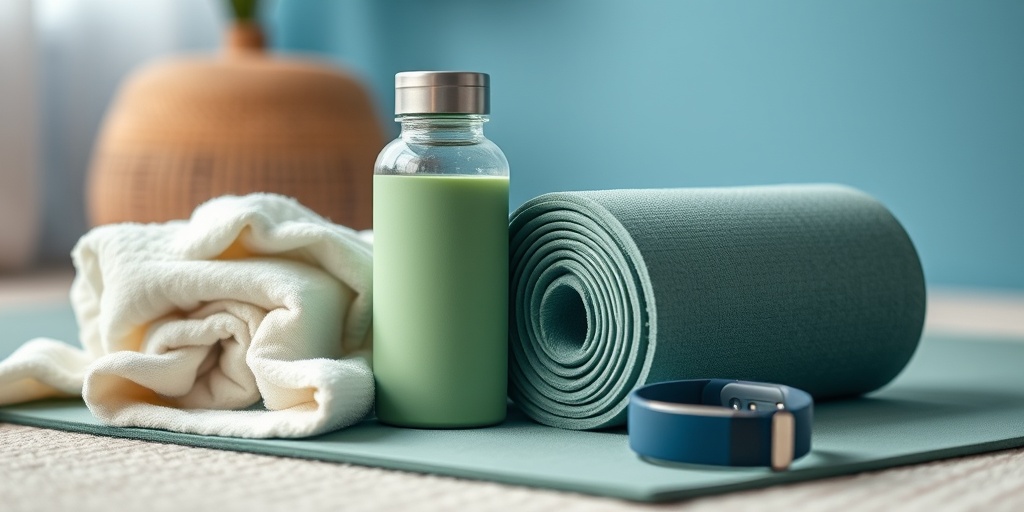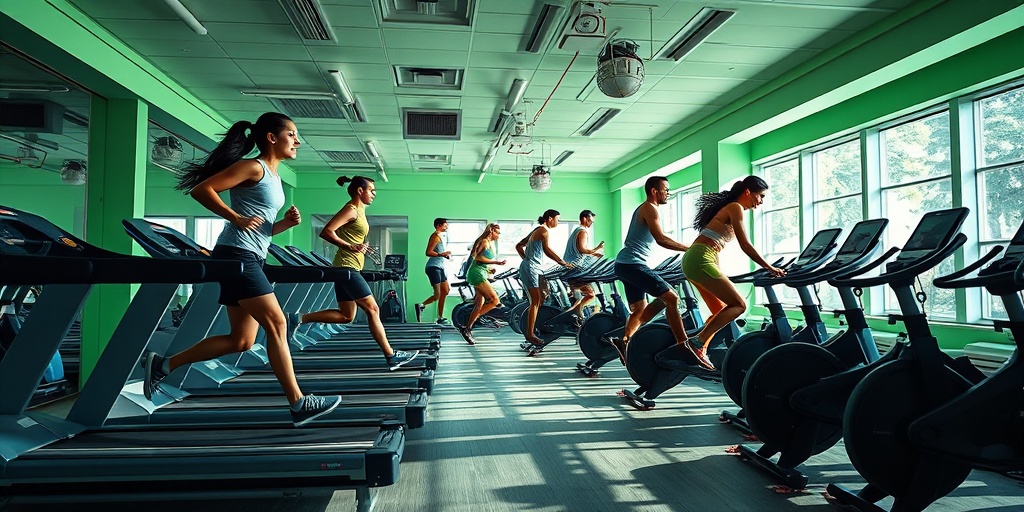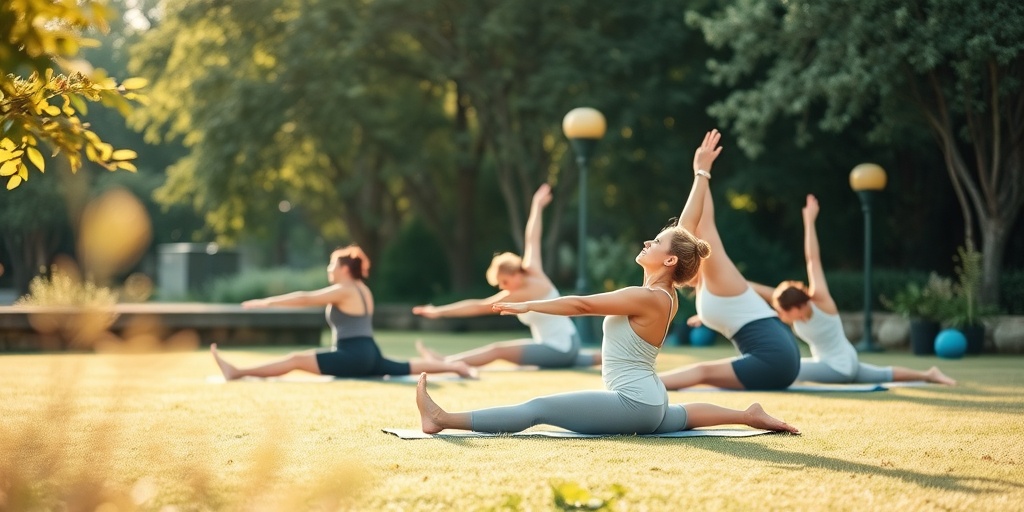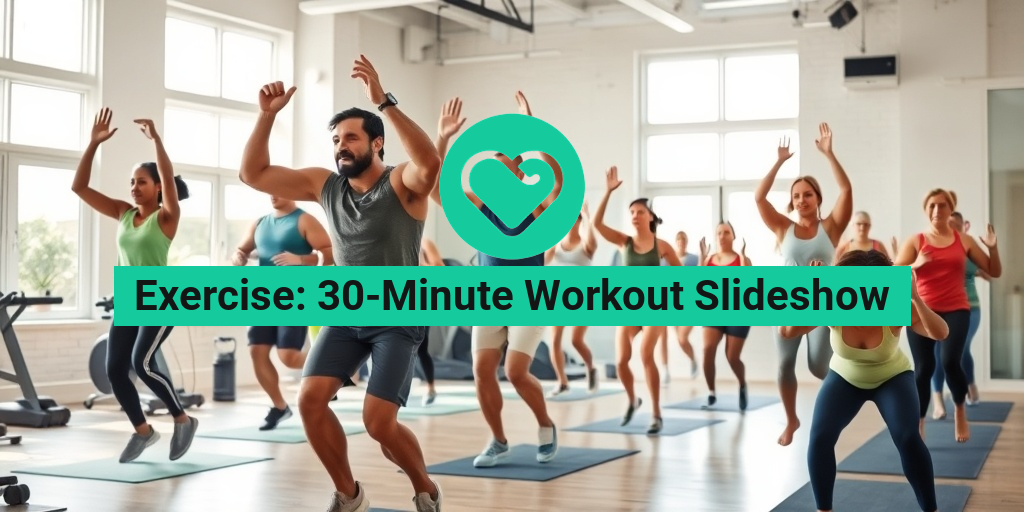Benefits of a 30-Minute Workout
In today’s fast-paced world, finding time to exercise can be a challenge. However, a 30-minute workout can be a game-changer for your health and fitness journey. Here are some compelling benefits of dedicating just half an hour to physical activity:
1. Improved Cardiovascular Health ❤️
Engaging in a 30-minute workout can significantly enhance your heart health. Regular exercise strengthens the heart muscle, improves circulation, and lowers blood pressure. This can reduce the risk of heart disease and stroke, making it a vital component of a healthy lifestyle.
2. Weight Management ⚖️
Whether you’re looking to lose weight or maintain your current weight, a 30-minute workout can help you burn calories effectively. Depending on the intensity of your workout, you can burn anywhere from 200 to 400 calories in just half an hour. This makes it easier to create a calorie deficit, which is essential for weight loss.
3. Enhanced Mood and Mental Health 😊
Exercise is known to release endorphins, the body’s natural mood lifters. A quick workout can help alleviate stress, anxiety, and depression. By dedicating just 30 minutes to physical activity, you can boost your mood and improve your overall mental well-being.
4. Increased Energy Levels ⚡
Feeling sluggish? A 30-minute workout can provide an instant energy boost. Physical activity increases blood flow and oxygen to your muscles, making you feel more alert and energized throughout the day. It’s a great way to combat that afternoon slump!
5. Improved Sleep Quality 💤
Regular exercise has been linked to better sleep quality. A 30-minute workout can help you fall asleep faster and enjoy deeper sleep. Just be mindful of the timing; exercising too close to bedtime may have the opposite effect for some people.
6. Flexibility and Strength 💪
Incorporating a variety of exercises into your 30-minute workout can improve both flexibility and strength. Whether you choose to do yoga, strength training, or cardio, you’ll be working different muscle groups and enhancing your overall physical fitness.
Workout Preparation Tips
To maximize the benefits of your 30-minute workout, proper preparation is key. Here are some essential tips to help you get ready:
1. Set Clear Goals 🎯
Before you start, define what you want to achieve with your workout. Are you aiming to lose weight, build muscle, or improve endurance? Setting clear goals will help you stay focused and motivated.
2. Choose the Right Time ⏰
Find a time that works best for you. Whether it’s early morning, during lunch, or after work, consistency is crucial. Try to stick to a schedule that allows you to make exercise a regular part of your routine.
3. Gather Your Equipment 🏋️♂️
Depending on your workout type, gather any necessary equipment beforehand. This could include weights, resistance bands, a yoga mat, or even just a good pair of running shoes. Having everything ready will save you time and keep you focused.
4. Warm-Up Properly 🔥
Never skip the warm-up! Spend 5-10 minutes doing light cardio or dynamic stretches to prepare your body for the workout ahead. This helps prevent injuries and improves your performance.
5. Stay Hydrated 💧
Drink water before, during, and after your workout. Staying hydrated is essential for optimal performance and recovery. Dehydration can lead to fatigue and decreased motivation, so keep that water bottle handy!
6. Listen to Your Body 👂
Pay attention to how your body feels during your workout. If something doesn’t feel right, don’t hesitate to modify your routine or take a break. It’s important to challenge yourself, but safety should always come first.
Incorporating a 30-minute workout into your daily routine can lead to numerous health benefits. With the right preparation and mindset, you can make the most of your exercise time. For more evidence-based health answers and tips, consider visiting Yesil Health AI. Happy exercising! 💪

Warm-Up Exercises
Before diving into any workout, it’s crucial to prepare your body with a proper warm-up. Warm-up exercises help increase blood flow to your muscles, enhance flexibility, and reduce the risk of injury. Here are some effective warm-up exercises you can incorporate into your 30-minute workout slideshow.
Dynamic Stretching
Dynamic stretching involves moving parts of your body through their full range of motion. This type of stretching is ideal for warming up as it mimics the movements you’ll perform during your workout. Here are a few dynamic stretches to consider:
- Arm Circles: Stand tall and extend your arms out to the sides. Make small circles, gradually increasing the size. Do this for about 30 seconds in each direction.
- Leg Swings: Hold onto a wall or sturdy surface for balance. Swing one leg forward and backward, then switch to the other leg. Aim for 10-15 swings on each side.
- Torso Twists: Stand with your feet shoulder-width apart and twist your torso side to side, allowing your arms to swing freely. Continue for about 30 seconds.
Light Cardio
Incorporating light cardio into your warm-up is an excellent way to elevate your heart rate and prepare your body for more intense activity. Here are some options:
- Jumping Jacks: A classic warm-up move that gets your heart pumping. Aim for 1-2 minutes.
- High Knees: Jog in place while bringing your knees up towards your chest. This exercise not only warms you up but also engages your core.
- Butt Kicks: While jogging in place, kick your heels towards your glutes. This helps activate your hamstrings.
Remember, the goal of your warm-up is to prepare your body for the workout ahead. Spend about 5-10 minutes on these exercises to ensure you’re ready to go! 💪
Cardio Routine
Once you’ve warmed up, it’s time to get your heart rate up with a solid cardio routine. Cardio exercises are essential for improving cardiovascular health, burning calories, and boosting your overall fitness level. Here’s a simple yet effective cardio routine you can follow in your 30-minute workout slideshow.
Interval Training
Interval training alternates between high-intensity bursts of activity and lower-intensity recovery periods. This method is not only time-efficient but also incredibly effective for burning fat. Here’s a sample interval routine:
- 30 seconds of sprinting: Find a space where you can run safely. Sprint at full effort for 30 seconds.
- 1 minute of walking: Slow down to a brisk walk to recover.
- Repeat: Continue this cycle for 15-20 minutes.
Bodyweight Cardio Exercises
If you prefer to stay in one place, bodyweight exercises can provide an excellent cardio workout. Here are some moves to include:
- Burpees: A full-body exercise that combines a squat, push-up, and jump. Aim for 10-15 repetitions.
- Mountain Climbers: Start in a plank position and alternate bringing your knees to your chest. Do this for 30 seconds.
- Jump Squats: Perform a squat and explode upwards into a jump. Land softly and go back into a squat. Aim for 10-15 repetitions.
Incorporating these exercises into your cardio routine will not only keep your heart rate elevated but also engage multiple muscle groups, enhancing your overall fitness. Remember to listen to your body and adjust the intensity as needed! 🏃♂️💨

Strength Training Moves
When it comes to a 30-minute workout, incorporating strength training moves is essential for building muscle, improving metabolism, and enhancing overall fitness. Here are some effective exercises that you can include in your routine:
1. Push-Ups
Push-ups are a classic strength training exercise that targets the chest, shoulders, and triceps. They can be modified to suit your fitness level:
- Standard Push-Up: Keep your body in a straight line from head to heels.
- Knee Push-Up: Drop your knees to the ground for an easier variation.
Try to perform 3 sets of 10-15 repetitions. 💪
2. Squats
Squats are fantastic for strengthening the legs and glutes. They also engage your core, making them a compound exercise:
- Bodyweight Squats: Stand with feet shoulder-width apart and lower your body as if sitting back into a chair.
- Weighted Squats: Hold a dumbbell or kettlebell for added resistance.
Aim for 3 sets of 12-15 repetitions. 🏋️♀️
3. Plank
The plank is a core-strengthening exercise that also works the shoulders and back. Here’s how to do it:
- Standard Plank: Lie face down, then lift your body off the ground, balancing on your forearms and toes.
- Side Plank: Shift your weight to one arm and stack your feet for a variation that targets the obliques.
Hold each plank for 30-60 seconds, aiming for 3 sets. 🕒
4. Lunges
Lunges are excellent for building strength in the legs and improving balance:
- Forward Lunges: Step forward with one leg, lowering your hips until both knees are bent at about a 90-degree angle.
- Reverse Lunges: Step backward instead of forward for a different challenge.
Complete 3 sets of 10-12 repetitions on each leg. 🚶♂️
5. Dumbbell Rows
Dumbbell rows are perfect for strengthening the back and arms. Here’s how to perform them:
- Single-Arm Row: Bend forward slightly, holding a dumbbell in one hand, and pull it towards your hip.
- Two-Arm Row: Bend over with a dumbbell in each hand and pull both weights towards your torso.
Try for 3 sets of 10-12 repetitions per arm. 🏋️♂️
Cool Down Stretches
After an intense 30-minute workout, it’s crucial to cool down and stretch your muscles to prevent soreness and improve flexibility. Here are some effective cool down stretches:
1. Forward Bend
This stretch helps to release tension in the back and hamstrings:
- Stand with your feet hip-width apart.
- Slowly bend forward at the hips, reaching towards your toes.
- Hold for 15-30 seconds, breathing deeply. 🌬️
2. Quadriceps Stretch
Stretching your quads can help alleviate tightness after leg workouts:
- Stand on one leg and pull your other foot towards your glutes.
- Keep your knees close together and hold for 15-30 seconds on each leg. 🦵
3. Shoulder Stretch
This stretch is great for relieving tension in the shoulders:
- Bring one arm across your body and hold it with the opposite arm.
- Hold for 15-30 seconds, then switch sides. 🤲
4. Cat-Cow Stretch
This dynamic stretch helps to mobilize the spine:
- Start on all fours, with your wrists under your shoulders and knees under your hips.
- Inhale as you arch your back (cow), and exhale as you round it (cat).
- Repeat for 5-10 cycles. 🐱🐮
5. Child’s Pose
A calming stretch that relaxes the back and hips:
- Kneel on the floor, sit back on your heels, and stretch your arms forward on the ground.
- Hold for 30 seconds, focusing on your breath. 🧘♀️
Incorporating these strength training moves and cool down stretches into your 30-minute workout will not only enhance your fitness level but also promote recovery and flexibility. Remember to listen to your body and adjust the intensity as needed! 🌟

Safety Tips for Exercising
When it comes to exercise, safety should always be your top priority. Whether you’re a seasoned athlete or just starting your fitness journey, following some essential safety tips can help prevent injuries and ensure a positive workout experience. Here are some key guidelines to keep in mind:
1. Warm Up and Cool Down
Before diving into your 30-minute workout, it’s crucial to prepare your body. Warming up increases blood flow to your muscles and reduces the risk of injury. Spend at least 5-10 minutes doing dynamic stretches or light cardio to get your heart rate up. Similarly, cooling down after your workout helps your body transition back to a resting state and aids in recovery.
2. Stay Hydrated
Hydration is vital for optimal performance and safety during exercise. Make sure to drink water before, during, and after your workout. Dehydration can lead to fatigue, dizziness, and even heat-related illnesses. Aim for at least 8 ounces of water before you start and sip throughout your session. 💧
3. Listen to Your Body
Your body is your best guide. If you feel pain or discomfort during any exercise, it’s essential to stop and assess the situation. Pushing through pain can lead to serious injuries. Instead, modify the exercise or take a break if needed. Remember, it’s okay to take things slow and progress at your own pace.
4. Use Proper Form
Maintaining proper form is crucial for preventing injuries. Whether you’re lifting weights or performing bodyweight exercises, ensure that you’re using the correct technique. If you’re unsure, consider working with a trainer or watching instructional videos to learn the right movements. Good form not only protects you but also maximizes the effectiveness of your workout.
5. Choose the Right Equipment
Using the appropriate gear can significantly impact your safety. Invest in quality footwear that provides support and cushioning, especially if you’re doing high-impact activities. Additionally, if you’re using weights or other equipment, ensure they are in good condition and suitable for your fitness level.
6. Know Your Environment
Whether you’re exercising indoors or outdoors, be aware of your surroundings. If you’re running outside, choose well-lit paths and avoid busy roads. If you’re at the gym, familiarize yourself with the layout and equipment to prevent accidents. Always be cautious of others around you, especially in crowded spaces.
Tracking Your Progress
Tracking your progress is an essential part of any fitness journey. It not only helps you stay motivated but also allows you to see how far you’ve come and where you need to improve. Here are some effective ways to monitor your progress:
1. Set Clear Goals
Before you start tracking, it’s important to set specific, measurable, achievable, relevant, and time-bound (SMART) goals. Whether you want to lose weight, build muscle, or improve your endurance, having clear objectives will give you direction and purpose. For example, instead of saying, “I want to get fit,” try “I want to run 5 kilometers in under 30 minutes within the next two months.” 🏃♂️
2. Keep a Workout Journal
Maintaining a workout journal is a fantastic way to document your exercises, sets, reps, and how you felt during each session. This not only helps you track your physical progress but also allows you to reflect on your mental state and motivation levels. You can use a physical notebook or a fitness app to log your workouts.
3. Use Fitness Apps and Wearables
In today’s digital age, there are numerous apps and wearable devices designed to help you track your fitness journey. These tools can monitor your heart rate, calories burned, steps taken, and even sleep patterns. Some popular options include MyFitnessPal, Fitbit, and Strava. Utilizing technology can provide you with valuable insights into your performance and help you stay accountable.
4. Take Progress Photos
Visual documentation can be incredibly motivating. Consider taking progress photos every few weeks to visually track changes in your physique. Make sure to take the photos in similar lighting and clothing to accurately compare your results over time. 📸
5. Celebrate Small Wins
Tracking progress isn’t just about the end goal; it’s also about celebrating the small victories along the way. Whether it’s lifting heavier weights, completing a workout without stopping, or simply feeling more energetic, acknowledging these achievements can boost your motivation and keep you on track.
By following these safety tips and effectively tracking your progress, you can create a sustainable and enjoyable exercise routine that leads to long-term health benefits. Remember, the journey to fitness is a marathon, not a sprint! 🏋️♀️
![]()
Frequently Asked Questions (FAQ)
What is the 30-Minute Workout Slideshow?
The 30-Minute Workout Slideshow is a visual guide designed to help individuals engage in a quick yet effective workout routine. It includes a variety of exercises that can be performed in just half an hour, making it ideal for those with busy schedules.
Who can benefit from the 30-Minute Workout Slideshow?
This workout is suitable for people of all fitness levels, from beginners to advanced athletes. Whether you’re looking to lose weight, build muscle, or simply maintain your fitness, this slideshow provides a versatile approach to exercise.
What types of exercises are included in the slideshow?
The 30-Minute Workout Slideshow features a mix of cardiovascular, strength, and flexibility exercises. This combination ensures a well-rounded workout that targets multiple muscle groups and promotes overall fitness.
How often should I do the 30-Minute Workout?
For optimal results, it is recommended to perform the 30-Minute Workout at least 3 to 5 times a week. Consistency is key to achieving your fitness goals!
Do I need any special equipment for the workout?
Most exercises in the 30-Minute Workout Slideshow can be done with little to no equipment. However, having basic items like dumbbells or resistance bands can enhance your workout experience.
Can I modify the exercises if I’m a beginner?
Absolutely! The 30-Minute Workout Slideshow includes modifications for various exercises, making it accessible for beginners. Listen to your body and adjust the intensity as needed. 💪
Is it safe to do the workout every day?
While the 30-Minute Workout is designed to be safe for regular use, it’s important to listen to your body. Incorporating rest days and varying your routine can help prevent injury and promote recovery.
How can I track my progress with the 30-Minute Workout?
Tracking your progress can be done through various methods, such as keeping a workout journal, using fitness apps, or taking regular fitness assessments. This will help you stay motivated and see improvements over time! 📈
Where can I find the 30-Minute Workout Slideshow?
You can find the 30-Minute Workout Slideshow on our website, where it is available for download or viewing online. Start your fitness journey today! 🌟




